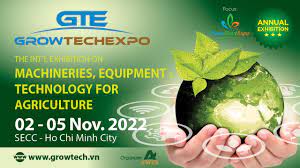
Deputy Minister of Agriculture and Rural Development Tran Thanh Nam (center) visits the booth of a Vietnamese enterprise at the Thaifex Anuga Asia 2022 specialized food and beverage fair.
The dream of Vietnamese agricultural products being processed deeply, with high prices, beautiful packaging, being favored by domestic consumers, and being hunted by major markets in the world is a beautiful dream but is it not too far away? Talking with subjects who make precious oriental products, we return to the question: How can they acquire new knowledge, skills, new techniques, creativity, and success in the social period? new entry?
We sent the question in advance to the leaders of the Ministry of Agriculture and Cooperatives of Thailand, preparing for the visit to take place on the morning of May 27, 2022, within the framework of the Thaifex-Anuga Food and Beverage Fair 2022. Unexpectedly, the question was researched by Thai leaders and soon had an open and frank answer.
The Ministry of Agriculture and Cooperatives of Thailand also welcomed the Vietnamese delegation with a strong force of 9 people. Deputy Minister Prapat Pothasuthon with 2 assistants. Mr. Ratchasub Nishida, chief advisor of the ministry's expert group. A director of the Livestock Department. An official in charge of the Department of Quality Standards. Representative of the Farmers' Union. In particular, there are 3 logistics companies.
Thailand looks straight ahead
Mr. Ratchasub Nishida, Chief Advisor of the Ministry of Agriculture and Cooperatives of Thailand, acknowledged the difficulties encountered in working with farmers. eloquently, he argues that if you do it the way previous generations have done it, you can't change the farmer. They are still producing as they have always been, and it is difficult to meet the new requirements, standards, and technical barriers from European, Asian, and American customers.
Advisor Ratchasub said that product innovation is not only about product innovation, but also about the people who make the product. Currently, many new machines and new technologies are supported such as artificial intelligence, the Internet of things... but those are just tools.
"Our experience over time is that if money and favorable policies are used to help them change, the change is not sustainable. The main point to make sustainable change is that farmers must deeply feel the need to change a mindset," said Mr. Ratchasub.
According to this advisor, the concept of sustainable development is too big and vague for people. While, their need is simply: to keep quality consistent, and adhere to strict standards every day. The same amount of work every day, if guaranteed, means that the people have developed sustainably.

The Vietnamese business delegation came to work with leaders of the Thai Ministry of Agriculture and Cooperatives.
After the Covid-19 epidemic, consumers increasingly focused on product quality, especially safety and stable quality. This new situation leads to production requiring strict standards and compliance. Businesses and farmers need to be sure of this information and pay more attention to the issues of daily contact with customers.
Regarding marketing, Thai farmers are also very interested. But in the new trend, marketing activities need changes. To make it easy for people to understand, the Thai Ministry of Agriculture and Cooperatives briefly interprets "marketing" into 3 letters M, K, and T; and at the same time specifies each component element as Meet (interaction), Credential (standard) and Trend (consumer trend).
That is, farmers want to do good marketing, need to master consumer trends, comply with standards and always interact with customers to understand. Two important keywords of the new period, when buying and selling transactions are often done via the Internet, are Customer trust and Good delivery service (right quality, on time).
In short, Mr. Ratchasub believes that, in order for farmers to always keep their energy and motivation to work, they only need to ask them: for stable quality and strict standards.
However, the secret lies in: After requesting, it is necessary to build a close-knit companion ecosystem to help farmers. While waiting for them to realize the fact that they must do the right thing to succeed, the Thai Ministry of Agriculture and Cooperatives organized a force of agricultural extension officers, promotion officers, technicians, and associations. .. so that each group supports farmers along the entire length of the value chain from input to output.
"At Thaifex, the bond between extension and promotion staff and farmers is clear to me. In the area of Geographical Indications, in almost every stall, I meet an expert on standards and standards. Teachers are in charge of R&D of universities, they are there to offer sales, introduce product features in-depth, and answer questions from customers, as well as the owners of cooperatives or businesses that have received the certificate. geospatial", Mr. Ratchasub shared.
The Thai advisor also left open the results, if the above professional force did not closely accompany farmers on a daily basis.
Vietnam story
The story of how to support Thai farmers is regularly discussed between the market experts of the Permanent Association of High-Quality Vietnamese Products and their colleagues in Ho Chi Minh City.
All are of the same opinion, that the process of change takes time, and cannot be referenced by workers in the factory - where there are KPIs, processes, productivity management, risk management, energy rewards, and penalties. capacity. Farmers are the most self-aware and free. For a long time, they got used to inertia in thinking. Any quality production can be sold, even if it is too difficult to sell, the price will be reduced to sell.
Farmers often ask three “classic” questions when asked to develop standards: Why should standards be followed? Do following standards sell for a higher price to offset production costs? Is it easier to follow standards to export and sell out?
Regarding problems when being detected using chemicals (fertilizers, pesticides) that are not on the list or in excess, farmers' awareness is still limited. They often argue: I sprayed in the middle of the night, the fields are dark, who knows? I only spray a little and let it take a few days for the medicine to wear off? Does this insecticide have a "quick kill, kill short", will the worms die right away?
If you are not used to living with farmers, any expert can be stunned, wanting not to "roll out dead" as they say. There have been many solutions tested before, but there is no real sustainable solution to this problem.
Collective fines when individuals violate is a way that has been applied by programs to support sustainable coffee production but has not been replicated. Build an interactive team, regularly share information and help each other correct deviations in the farming process; or close support at each stage, avoiding the situation of "cooked rice into rice" is also a way, but it takes a lot of effort to get certain results.
To help farmers change, in the end, we still return to the radical solution. In the short term, make them understand the necessary condition - daily efforts are the root cause of success. Then there are enough conditions - building a practical and companion ecosystem with farmers, with the cost of human and energy is not light.
Do we have that ecosystem? The tray is always available, just lacks the professionalism and dedication of each component in the apparatus and the rhythm and matching to succeed.
As long as you keep the old power, the strong way everyone does it... it's not strong.






.png)